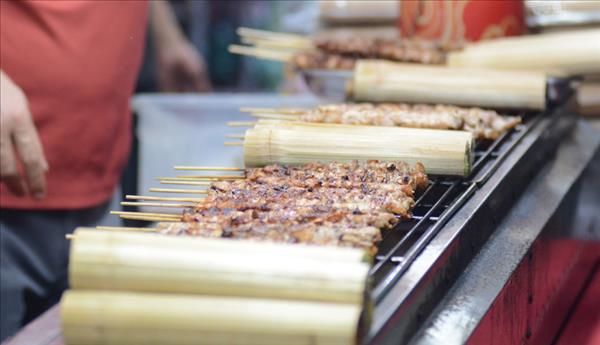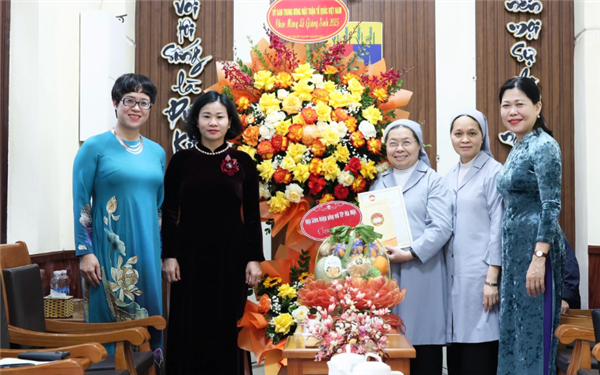Nguyen Thi Kim Truyen from Ben Tre province’s Chau Thanh district, who has been making coconut oil for decades, has started selling her product online.
Truyen has learned how to post photos and information about her products on the Lazada website under a scheme to help businesses sell products via e-commerce platforms.
At first, Truyen, 51, struggled to learn how to use a smartphone or computer but she never felt discouraged. “We should try something new to be able to reach more customers,” she said.
She has confidence in the scheme as today people prefer buying products online due to “fast shipping, affordable and reasonable prices”, she said.
Her shop is one of many small- and medium-sized enterprises (SMEs) making coconut products in the province, known as the country’s “coconut capital”.
Coconut in Ben Tre has gained a reputation for high quality from local and foreign experts.
Products include food (cakes, candy, jelly, milk); cosmetics (oil, masks, lip balm, essential oil, shampoo, mosquito repellent); handicrafts (coconut shells, spoon sets, tea sets) and products for the industrial sector (activated carbon from coconut shells, coconut fiber), among others.
Many businesses have become more aware of using technology to improve productivity and quality. However, most coconut enterprises in Ben Tre find it hard to increase sales via traditional selling.
Le Thi Hue My, owner of Yes Coco, a company that produces handicrafts, in Hữu Định Commune in Chau Thanh District, said that previously most businesses sold their products via traders at much lower prices.
“Cheap products with unstable revenue have caused obstacles for farmers,” she said.
Last month, nearly 50 representatives from businesses that make coconut products in Ben Tre took part in the seminar “Bringing E-commerce to the Countryside – Ben Tre Online Coconut Village”.
The workshop was organised by the Vietnam E-commerce Association, VECOM, and Lazada Vietnam in collaboration with Ben Tre Department of Industry and Trade.
Nguyen Ngoc Dung, vice chairman of VECOM, said that farmers and small business households in rural areas lacked information and skills needed to bring their products to market.
The workshop provided knowledge for producers of speciality coconut goods in rural villages to reach consumers in the fastest way.
“E-commerce will help crafts villages expand their businesses, save marketing costs, and increase product value,” he said.
This is one of Lazada’s key projects in its plan to build a sustainable e-commerce ecosystem by 2030.
Yes Coco enterprise was among the first beneficiaries to receive support from the project. Many of the company’s coconut tree products such as dining room appliances, pots for plants, handbags and greeting cards have become popular.
Businesses participating in the project can open free online booths without commission fees paid to the Lazada platform. Enterprises are also provided with management tools such as inventory and sales management.
Ben Tre province is home to 163,000 households involved in farming 71,000 ha of coconut trees, or half of Vietnam’s coconut-growing land.
They produce 800 million coconuts and ship about 200 million VND worth of coconut products abroad annually.
Ben Tre’s coconuts are exported to about 84 countries and territories worldwide.
Truyen has learned how to post photos and information about her products on the Lazada website under a scheme to help businesses sell products via e-commerce platforms.
At first, Truyen, 51, struggled to learn how to use a smartphone or computer but she never felt discouraged. “We should try something new to be able to reach more customers,” she said.
She has confidence in the scheme as today people prefer buying products online due to “fast shipping, affordable and reasonable prices”, she said.
Her shop is one of many small- and medium-sized enterprises (SMEs) making coconut products in the province, known as the country’s “coconut capital”.
Coconut in Ben Tre has gained a reputation for high quality from local and foreign experts.
Products include food (cakes, candy, jelly, milk); cosmetics (oil, masks, lip balm, essential oil, shampoo, mosquito repellent); handicrafts (coconut shells, spoon sets, tea sets) and products for the industrial sector (activated carbon from coconut shells, coconut fiber), among others.
Many businesses have become more aware of using technology to improve productivity and quality. However, most coconut enterprises in Ben Tre find it hard to increase sales via traditional selling.
Le Thi Hue My, owner of Yes Coco, a company that produces handicrafts, in Hữu Định Commune in Chau Thanh District, said that previously most businesses sold their products via traders at much lower prices.
“Cheap products with unstable revenue have caused obstacles for farmers,” she said.
Last month, nearly 50 representatives from businesses that make coconut products in Ben Tre took part in the seminar “Bringing E-commerce to the Countryside – Ben Tre Online Coconut Village”.
The workshop was organised by the Vietnam E-commerce Association, VECOM, and Lazada Vietnam in collaboration with Ben Tre Department of Industry and Trade.
Nguyen Ngoc Dung, vice chairman of VECOM, said that farmers and small business households in rural areas lacked information and skills needed to bring their products to market.
The workshop provided knowledge for producers of speciality coconut goods in rural villages to reach consumers in the fastest way.
“E-commerce will help crafts villages expand their businesses, save marketing costs, and increase product value,” he said.
This is one of Lazada’s key projects in its plan to build a sustainable e-commerce ecosystem by 2030.
Yes Coco enterprise was among the first beneficiaries to receive support from the project. Many of the company’s coconut tree products such as dining room appliances, pots for plants, handbags and greeting cards have become popular.
Businesses participating in the project can open free online booths without commission fees paid to the Lazada platform. Enterprises are also provided with management tools such as inventory and sales management.
Ben Tre province is home to 163,000 households involved in farming 71,000 ha of coconut trees, or half of Vietnam’s coconut-growing land.
They produce 800 million coconuts and ship about 200 million VND worth of coconut products abroad annually.
Ben Tre’s coconuts are exported to about 84 countries and territories worldwide.
VNS/VNA

















